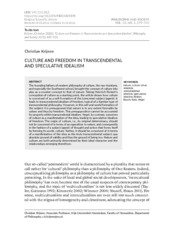Приказ основних података о документу
Culture and Freedom in Transcendental and Speculative Idealism
Kultura i sloboda u transcendentalnom i spekulativnom idealizmu
| dc.creator | Krijnen, Christian | |
| dc.date.accessioned | 2022-07-06T09:46:58Z | |
| dc.date.available | 2022-07-06T09:46:58Z | |
| dc.date.issued | 2022 | |
| dc.identifier.issn | 0353-5738 | |
| dc.identifier.uri | http://rifdt.instifdt.bg.ac.rs/123456789/2656 | |
| dc.description.abstract | The founding fathers of modern philosophy of culture, the neo-Kantians, and especially the Southwest school, brought the concept of culture into play as a counter concept to that of nature. Taking Heinrich Rickert’s conception of culture as a starting point, the article shows how culture is conceived of as a self-formation of the (concrete) subject (agent). It leads to transcendental idealism of freedom, typical of a Kantian type of transcendental philosophy. However, in this self and world formation of the subject it is presupposed that nature is to any extent formable by values and thus by freedom. This presupposition cannot be accounted for properly within transcendental idealism. Hegel, by contrast, conceives of culture as a manifestation of the idea, leading to speculative idealism of freedom. The origin of culture, i.e., its original determinacy, should not be conceived of in terms of an opposition to nature, and consequently in the fashion of a subject (agent) of thought and action that forms itself by forming its world, culture. Rather, it should be conceived of in terms of a manifestation of the idea as the truly transcendental subject qua absolute ground of validity and thus the ground of being too. Nature and culture are both primarily determined by their ideal character and the relationships emerging therefrom. | sr |
| dc.description.abstract | Osnivači moderne filozofije kulture, neo-kantovci, a posebno jugozapadna škola, uveli su koncept kulture u rasprave kao kontra-koncept konceptu prirode. Uzimajući kao polaznu tačku koncepciju kulture Hajnriha Rikerta, pokazuje se kako se kultura shvata kao samoformiranje (konkretnog) subjekta (delatnika). Ona vodi ka transcendentalnom idealizmu slobode, tipičnom za kantovsku vrstu transcendentalne filozofije. Međutim, u ovakvom formiranju sebe i sveta subjekta pretpostavlja se da je priroda u nekoj meri uobličena vrednostima, a time i slobodom. U okviru transcendentalnog idealizma, ova pretpostavka se ne može uverljivo objasniti. Hegel, nasuprot ovome, shvata kulturu kao manifestaciju ideje koja vodi ka spekulativnom idealizmu slobode. Poreklo kulture, odnosno njenu prvobitnu determinisanost, ne treba shvatati u smislu suprotstavljanja prirodi, a shodno tome, ni u smislu suprotstavljanja subjektu (delatniku) mišljenja i delanja koji se formira tako što formira svoj svet, odnosno kulturu. Umesto toga, poreklo kulture trebalo bi da se shvati u smislu manifestacije ideje kao istinski transcendentalnog subjekta kao apsolutnog osnova valjanosti, a time i kao osnova samog bića. Priroda i kultura su prvenstveno određene njihovim idealnim karakterom i odnosima koji iz toga proizlaze. | sr |
| dc.language.iso | en | sr |
| dc.publisher | Beograd : Institut za filozofiju i društvenu teoriju | sr |
| dc.rights | openAccess | sr |
| dc.rights.uri | https://creativecommons.org/licenses/by-nc-nd/4.0/ | |
| dc.source | Filozofija i društvo / Philosophy and Society | sr |
| dc.subject | nature | sr |
| dc.subject | culture | sr |
| dc.subject | value | sr |
| dc.subject | freedom | sr |
| dc.subject | transcendental idealism | sr |
| dc.subject | speculative idealism | sr |
| dc.subject | Rickert | sr |
| dc.subject | Bauch | sr |
| dc.subject | Kant | sr |
| dc.subject | Hegel | sr |
| dc.title | Culture and Freedom in Transcendental and Speculative Idealism | sr |
| dc.title | Kultura i sloboda u transcendentalnom i spekulativnom idealizmu | sr |
| dc.type | article | sr |
| dc.rights.license | BY-NC-ND | sr |
| dc.citation.issue | 2 | |
| dc.citation.volume | 33 | |
| dc.citation.spage | 407 | |
| dc.citation.epage | 419 | |
| dc.identifier.doi | 10.2298/FID2202407K. | |
| dc.type.version | publishedVersion | sr |
| dc.identifier.fulltext | http://rifdt.instifdt.bg.ac.rs/bitstream/id/9292/bitstream_9292.pdf |

